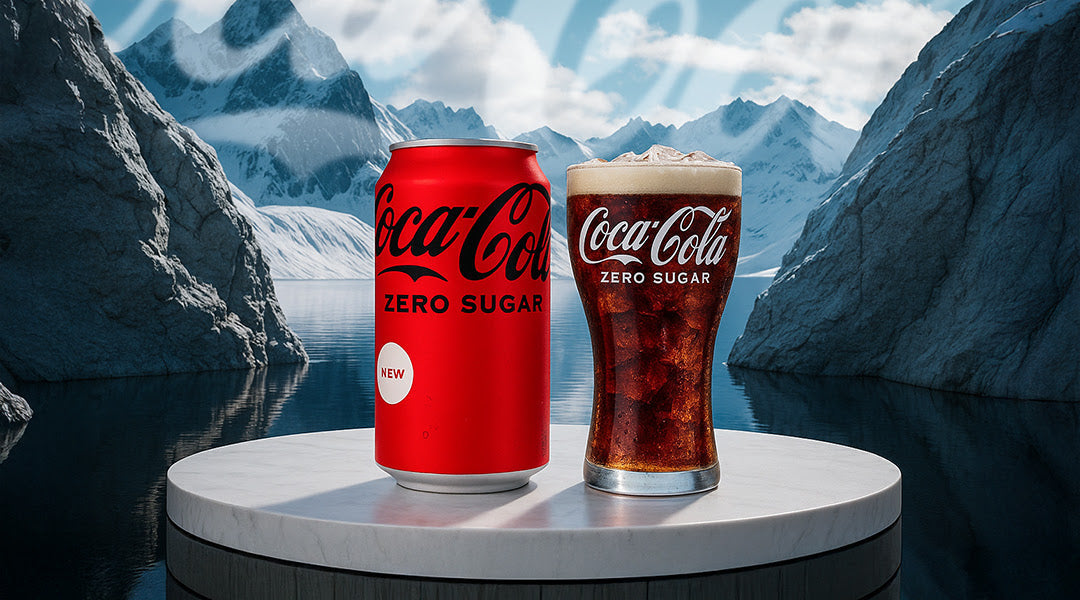
How Much Caffeine is in Cola Zero?
Quick Answer
Cola Zero contains 32-34 mg of caffeine in each 12 oz can. This is about one-third the caffeine found in a standard cup of coffee. For those wanting to avoid caffeine completely, Coca-Cola offers Coca-Cola Zero Caffeine Free, which provides the same taste experience without any caffeine.
Key Takeaways
- Cola Zero contains 32-34 mg caffeine per can.
- Coffee packs about three times more caffeine than Cola Zero.
- Artificial sweeteners replace sugar in Cola Zero.
- Caffeine-free versions exist for those avoiding stimulants.
- The formula has been updated several times since its 2005 launch.
Many people grab a Cola Zero every afternoon. They think it's a healthier option than regular soda. The zero-sugar part seems great, but few consider the caffeine content. What we discovered might surprise you!
What Is Cola Zero?

Coca-Cola Zero Sugar (commonly known as Coke Zero) is a diet soda produced by the Coca-Cola Company. It first appeared in 2005 as Coca-Cola Zero, marketed as a no-calorie cola alternative. According to Wikipedia, this launch represented Coca-Cola's largest product introduction in 22 years.
The drink stands out because it aims to taste more like regular Coca-Cola than Diet Coke does. This flavor profile has made it extremely popular – as of 2024, Coke Zero ranks as the seventh best-selling soda in the United States and has experienced the largest rise in market share among sodas since its 2005 debut.
Coca-Cola Zero has gone through several reformulations. Major changes occurred in 2017 when the name changed to "Coca-Cola Zero Sugar," and again in 2021 when the recipe was adjusted in multiple countries. Each time, the company worked to make the taste closer to regular Coca-Cola but without the sugar.
Caffeine Content in Cola Zero Compared
How much caffeine does Cola Zero actually contain? Each 12-ounce can pack 34 mg of caffeine according to Corner Coffee Store. This puts it slightly lower than Diet Coke, which contains about 46 mg per can.
But how does this compare to other caffeinated drinks?
Regular cup of coffee (8 oz): 90-100 mg caffeine
Cola Zero (12 oz can): 32-34 mg caffeine
Diet Coke (12 oz can): 46 mg caffeine
Caffeine tablets: 100-200 mg caffeine
Green tea (8 oz): 30-50 mg caffeine
As you can see, Cola Zero contains much less caffeine than a standard cup of coffee – roughly one-third the amount. This makes it a milder option for those who want a slight caffeine boost without the stronger effects of coffee.
Ingredients in Cola Zero

Cola Zero gets its sweetness without sugar thanks to artificial sweeteners. The main sweeteners used are aspartame and acesulfame potassium (Ace-K). These compounds provide the sweet taste without adding calories or affecting blood sugar levels.
A typical 12 oz can of Cola Zero contains:
- Carbonated water
- Caramel color
- Phosphoric acid
- Aspartame
- Potassium benzoate (preservative)
- Natural flavors
- Acesulfame potassium
- Caffeine
The drink also contains small amounts of sodium and potassium – about 60 mg each, which represents around 2% of the recommended daily intake. People with phenylketonuria (PKU) should note that Cola Zero contains phenylalanine from the aspartame.
Interestingly, the caffeine-free version replaces caffeine with potassium citrate but keeps the other ingredients largely the same.
Cola Zero vs. Diet Coke: What's the Difference?

Both Cola Zero and Diet Coke are sugar-free, calorie-free options from Coca-Cola, but they differ in several important ways.
Diet Coke came first, launching in 1983, a full 23 years before Coca-Cola Zero arrived in 2006. According to Deseret News, Diet Coke has a more bitter taste profile, partly due to containing citric acid, which Cola Zero doesn't have.
The caffeine content differs too. Diet Coke contains more caffeine at 46 mg per can compared to Cola Zero's 34 mg. This difference might seem small, but it could matter for those sensitive to caffeine's effects.
The most significant difference lies in taste intent. Diet Coke has its own distinct flavor profile, never meant to taste exactly like regular Coca-Cola. Cola Zero, however, was specifically designed to taste as close as possible to regular Coca-Cola. This makes Cola Zero the better choice for those who want the classic Coke taste without the sugar.
Is Cola Zero healthy?

Let's be clear – "healthy" might be stretching it. But compared to regular soda, it eliminates sugar and calories, which can benefit those watching their weight or blood sugar.
The artificial sweeteners in Cola Zero have been approved as safe by the FDA. However, some research suggests they might affect insulin levels. Even though Cola Zero contains no sugar, the artificial sweeteners may cause insulin to rise, potentially complicating matters for those with diabetes or insulin resistance.
Some people report digestive issues like bloating after drinking artificially sweetened beverages. Others find that these drinks increase cravings for sweet foods. The caffeine, though modest compared to coffee, could affect sleep if consumed later in the day.
For most adults, moderate consumption likely poses minimal health concerns. But water, unsweetened tea, or other less processed beverages remain better everyday choices.
Caffeine-Free Alternatives

Good news if you want to skip caffeine completely—Coca-Cola makes Coca-Cola Zero Caffeine Free. It tastes almost the same as Cola Zero, just without the buzz. Potassium citrate takes the place of caffeine, but otherwise, the drink is nearly identical.
Other caffeine-free sodas you can try:
- Sprite Zero – lemon-lime flavor without caffeine
- Fanta Zero – comes in different fruit flavors
- Caffeine-Free Diet Coke
- Flavored sparkling waters
These let you enjoy bubbles and flavor without caffeine messing with your sleep or raising anxiety.
Frequently Asked Questions (FAQ)
Does Cola Zero have any health benefits?
Not really. The main plus is what it doesn’t have—no sugar and no calories. It can calm soda cravings without the sugar rush. But it still contains artificial sweeteners and additives. The caffeine may give you a small energy lift, and that’s about it.
Does Cola Zero affect insulin levels?
Yes. Even without sugar, sweeteners in Cola Zero can trigger an insulin response in some people. For those with diabetes or insulin resistance, that can complicate blood sugar control. Best advice—drink in moderation.
Can kids drink Cola Zero?
There are no strict rules against it, but it’s not the smartest choice for kids. The caffeine can hit them harder than adults, leading to sleep issues or hyper energy. Sweeteners also raise concerns for growing bodies. Safer picks are water, milk, or natural fruit juice now and then.
Is Cola Zero good for weight loss?
It can help since it cuts the calories found in regular soda. But some studies suggest sweeteners might increase cravings for sugary foods or confuse your body’s calorie signals. It’s better than regular soda for weight control, but water is still the best choice.
How much caffeine is in Cherry Cola Zero?
Cherry Cola Zero has the same amount as regular Cola Zero—about 34 mg per 12-ounce can. The flavoring doesn’t change the caffeine level.
Should You Choose Cola Zero?
Cola Zero works as an option for soda fans who want less sugar and fewer calories. The caffeine content is lower than coffee but still enough for a light pick-me-up. That balance makes it popular.
For people avoiding caffeine completely, the Caffeine-Free version*is the answer. It gives the same taste and fizz, without the stimulant.
Either way, moderation matters. Even zero-calorie sodas are better as an occasional treat, not a daily habit.
Water is still the best drink for everyday hydration. But when you want something more fun, now you know exactly what’s in your can of Cola Zero.
About the Author
This article was written by the Lifeboost writing team. We focus on nutrition, drinks, and lifestyle topics. Our research uses trusted sources like Coca-Cola’s official nutrition info, health sites, and reviews on sweeteners and caffeine.
Disclaimer: This article is for education only. It’s not medical advice. Always talk to a healthcare professional before making major changes to your diet.







